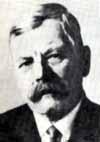
The Makhnovist playwright
A short biography of celebrated Bielorussian playwright Grigor Kobets, who fought with the Makhnovists

Nick Heath
Grigori Kobets was born on the 12th (24th Gregorian calendar) July 1898 in Elizavetgrad (now Kirovohrad) in the Ukraine within the Russian Empire.
He fought in the Russian Army on the Galician front between 1914-1916, where he was wounded. Between 1916-1918 he worked in a railway works. He participated in both the February and October Revolutions within the Nabat anarchist confederation and for a time fought with Makhnovist armed detachments and was with them when they fought alongside the Red Army and then were incorporated into the Red Army. He participated in the defence of a Jewish town in the Kirovograd region either from the Petliurists or the forces of Grigoriev during a pogrom of the Jews.
With the ending of the pact and the attacks on the Makhnovists by the Bolsheviks he had to hide from the Cheka and moved to Minsk where he worked as a stoker. Here he married. His activity as an anarchist and a Makhnovist was never forgiven and he never received a State pension.
In 1928 he graduated from Minsk evening school and between 1929-1930 worked on a newspaper. He worked at the Minsk Teachers Institute in 1934.He was awarded the title of Honoured Artist of the Bielorussian Soviet Socialist Republic in 1935. He was author of the play Guta, written in the late 20s, which won the first prize at the First-All-Union competition of Theatrical Arts in Moscow.
He worked through the thirties in Birobidzhan writing for the Paper Pacific Star. In 1938 he was arrested by the Stalinist secret police and held for nine months and tortured, accused of spying for Japan, Poland and England but was acquitted the following year. In 1939-1941 he worked as an editor for the newsreel studio Transbaikalia in Khabarovsk. He wrote film scripts for the 1940 musical comedy Happy Beach. His films were very popular throughout the Soviet Union until he fell under suspicion and they were all withdrawn from circulation.
In 1941 he was arrested again for "anti-Soviet agitation" and sentenced to be executed by firing squad, which was commuted to ten years in the prison camps. He worked in Taishet on the railways with a squad of criminals who he succeeded in winning over. He had been placed with them with the expectation by the authorities that he would be murdered. He was released at the end of this period. He stayed in Kirghizia and joined the sovkhoz (State farm) Chaldovar.
In 1958 he returned to Minsk. In October 1960 he was rehabilitated. He died on the 9th September 1990.
Sources:
http://mishpoha.org/6/cobec1.html
http://www.kino-teatr.ru/kino/screenwriter/sov/47038/bio/
Source: Libcom
Return to The Nestor Makhno Archive